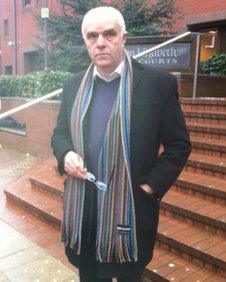Signalman and Network Rail guilty over level crossing death
- Published
Jane Harding, 52, who died, was a passenger in a car that was hit by a train in 2010
Network Rail and a signalman have been found guilty of failing to ensure the safety of a woman who was killed at a level crossing.
Jane Harding, 52, died when the car she was in was hit by a train at Moreton-on-Lugg, Herefordshire, in 2010.
Birmingham Crown Court heard safety barriers had been raised before the collision on 16 January.
Network Rail and Adrian Maund, 43, are due to be sentenced at the same court on 10 April.
Both had denied breaching health and safety regulations.
Mrs Harding's husband Mark said: "Three years ago we lost an extremely special person in an accident that could and should have been prevented.
"I only know that had Network Rail installed available engineer protection at the crossing or the signalman had not raised the barriers on that fateful day we would and should not be here today."
'In a dither'
During the two-week trial, the prosecution told the court Maund, from Caswell Crescent, Leominster, Herefordshire, had put down the barriers as normal for a passing train.
The jury heard Maund then "got himself into a dither" when a farmer rang his signal-box for a second time asking if it was safe to walk his sheep over another crossing further up the track.

Network Rail and Adrian Maund are to be sentenced on 10 April.
Prosecutor Philip Mott QC said because the signalman did not want the farmer to wait any longer, Maund "panicked" and lifted the barriers, but failed to see the Manchester Piccadilly to Milford Haven train approaching.
Jurors were told the crash caused the car, which was being driven by Mrs Harding's husband Mark, to flip over.
She died in hospital, while her husband suffered pelvic and shoulder injuries.
The Arriva Trains Wales service also hit another car being driven in the opposite direction, although the two passengers escaped with minor injuries.
Mr Mott told the court although it may be a case of "human error", Maund's former employer Network Rail was equally culpable for Mrs Harding's death because it had not fitted an automatic-locking device at the Moreton-on-Lugg crossing as part of improvement works there.
'Deliberate decision'
He said; "In 2009, a lot of work was carried out at the Moreton-on-Lugg level crossing.
"The barriers were replaced [and] there was a discussion whether to put in something called 'approach locking' - a device developed in the 1960s which picks up electrical signals to show whether or not a train has gone through.
"Network Rail took the decision not to install this device because it would cost £40,000 - that device could have saved a life."

Mark Harding said the accident "could and should have been prevented"
In court, Network Rail executives disputed the £40,000 cost of installing the device, claiming it could be 10 times that sum.
In a statement after the hearing, the company said: "We are deeply sorry that, through no fault of their own, the Hardings found themselves involved in a fatal train accident,
"Since the accident, alterations have been made at Moreton, and other similar crossings, to prevent such a rare signaller error leading to tragic consequences."
Jayne Salt, from the West Midlands Crown Prosecution Service, said Maund and Network Rail had both played a part in Mrs Harding's death.
She said: "His momentary error, his failure to follow procedures and checks, as he had been trained to do, has rightly resulted in his conviction.
"His employers, on the other hand, made a deliberate decision not to install a safety device which would have detected the oncoming train and kept the barriers down.
"That decision was based on cost.
"It is right that an organisation that holds the safety of the public in its hands on a daily basis has been held to account for its decision-making."
- Published5 February 2013
- Published1 March 2011